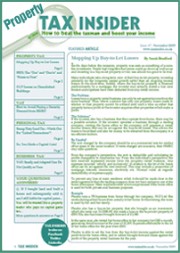Before you go, sign up to our free tax saving email course. Get 7 top property tax saving strategies in your email inbox that will help you save thousands in tax. Unsubscribe any time.
 Alan Pink looks at the use of companies in certain circumstances following the introduction of a restriction in the deduction of finance costs such as interest for non-corporate landlords from 6 April 2017. Alan Pink looks at the use of companies in certain circumstances following the introduction of a restriction in the deduction of finance costs such as interest for non-corporate landlords from 6 April 2017.A Property Tax Insider reader writes: ‘It seems landlords are being advised to set up a 'lettings/management' company to get around the interest relief reductions. The aim is that their company will then charge 'letting/management' fees to reduce the interest tax rate hit. Please can you comment on this.’ First, we need to put this question in context. The interest relief reduction referred to, which we have called by its nickname of ‘Osborne Tax’ in the title to this piece, is being phased in over four years starting on 6 April 2017. It affects those who have buy-to-let residential property portfolios which are subject to mortgages. Until 5 April 2017, the interest paid on mortgages which formed part of a property letting business was fully deductible for income tax purposes against the rents. As part of a politically motivated ‘squeeze’ on buy-to-let landlords and the booming residential property market, George Osborne announced, in his last Budget, that the relief would be phased out for higher rate income tax purposes over a four-year period. So, in the 2017/18 tax year, 75% of such interest will be claimable rather than the full 100% for higher rate tax purposes; in the next tax year the percentage will be 50%, and so on until, finally, on 6 April 2021, relief will be available only at the basic rate. This restriction does not apply to limited companies, for the simple reason that limited companies don’t pay higher rate tax: they just pay a flat rate of corporation tax, which in the current year is 19%. ‘Moving’ profits into companies So, the name of the game for landlords looking to avoid or reduce the effect of this substantial tax hit is to bring about the position, where possible, that profits are shown inside limited companies, rather than being chargeable on individuals. Of course, there are various ways of doing this, and we’ll sum up the position later on. However, the particular idea being looked at here is arguably the simplest. You set up a company (if you haven’t already got one) and that company provides management and letting agent type services to you as the owner of the buy-to-let properties. To this extent, the charge going into the company reduces the profits on which you are chargeable to income tax, and therefore potentially subject to the ‘Osborne Tax’ restrictions, and instead puts an amount of profit into the accounts of the limited company, which isn’t so subject. The first thing I ought to say is that, subject to the points made below, this idea undoubtedly works. However, the points I’m making below do highlight the fact, I think, that this is not going to be a complete solution, or a very satisfactory solution, for very many people. Let’s consider these points one by one. The debit side
Assuming, then, that the money is paid into the company, how do you get it out? If it is paid to you as a dividend, as a shareholder of the company, you’re unlikely to have achieved any tax benefit; indeed, there may be the reverse of the benefit because of the addition of a 7.5% ‘dividend tax’, which applies to dividends from companies after 6 April 2016. Some benefit may be obtained, no doubt, however, if you have other family members who can be given shares in a company (not children of yours under 18). By distributing the dividends around those who have allowances to offset, you may still end up reasonably on the right side of the ledger. Also, of course, if you don’t need that particular money and are content to see it building up in the company, perhaps to form the basis of a deposit for a new property, which might be bought by that company, then the problem we have outlined here won’t apply (instead, other problems, derived from owning properties in companies, might apply). If you let the money roll up in the company with a view to winding it up in due course, bear in mind that, under current rules, there would be a 20% capital gains tax charge on the winding up, which, apart from the deferral, could also be seen as very much reversing the higher rate tax benefits of putting these amounts into the company in the first place. Practical Tips: I may well have put a lot of people off the idea of setting up a letting/management company in what I’ve said above! But are there any better options? For the benefit of people who are still undecided how they are going to react to the Osborne Tax, perhaps a very brief summary of what I see at the main planning options might be useful, so here goes:
This is a sample article from the monthly Property Tax Insider magazine. Go here to get your first free issue of Property Tax Insider. |


 Tax Articles
Tax Articles